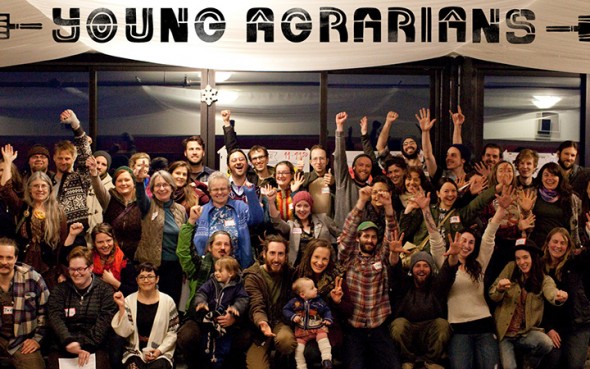When did you know that you wanted to work in food?
I started farming in 2006 after meeting a farmer, and quickly fell in love with it. I had lived in a city all of my life and travelled - but I had never worked the land. Having a physical connection with nature changed me. Pulling food out of the ground is the most incredible feeling. Hence began my desire to learn more about ecosystems and in 2008 I took an 8-month scale organic farming program and permaculture design course at Linnaea Farm on Cortes Island. I spent the next 2.5 years farming between Canada and Mexico. When I returned to city living at the end of 2010, I began teaching permaculture design and founded (and continue to produce and manage) a network for new and young ecological farmers in Canada called Young Agrarians. My farm adventures can be found here: farmlove.org. Please visit youngagrarians.org to learn about this rad network of soil lovers.
How did you get your current good food job?
I began sharing the idea of Young Agrarians and consulting with farming groups and organizations, and then with funders to bring in resources to coordinate a collaborative resource network for new entrants. So I was able to create the job through relationships.
How did your previous work or life experience prepare you for a good food job?
I have worked for several years in the nonprofit sector for arts, youth and social change organizations. From 2006 - 2012, I worked with a youth arts empowerment organization called the Power of Hope. Power of Hope offers programs for youth at the farm school I trained at on Cortes. They are incredible. I was able at the time to bring together my love for the earth and farming into facilitating workshops for youth focused on permaculture and the soil. I also took a number of facilitator trainings through Power of Hope that gave me the skills I needed to take a leadership role organizationally, and begin to facilitate community building activities by and for new and young farmers. Now its all farmers, all the time!
What was the greatest obstacle you had to overcome in pursuing your Good Food Job dream?
Young Agrarians started out as a very ambitions program to help solve problems for new farmers and provide services. The problems of course are big: access to land, capital, markets, education, etc. Over the past four years, we've developed a program framework that is lean but works to address these specific issues in meaningful ways. Whats helped me persevere are on-going conversations with new farmers that have been impacted by the work and able to connect into people and resources they needed. I believe that at least half of future entrants into agriculture will go into ecological production, and there will be more demand over time for the type of support we provide. What challenges me the most is growth, figuring out how to keep up with it - and of course how do we fund projects once they become programs. Funding these days is very much focused on projects rather than programs and the type of work we do is long-term and needs long-term funding.
Name one positive thing that a former employer taught you that you continue to appreciate?
Having worked for years in the nonprofit sector, I appreciate all of my bosses and managers that taught me how to coordinate projects with long timelines. Doing the work that I do now I have to think about things that happen over time, and create impact over months and years. Patience is fundamental to this type of work. So I am grateful for that.
What can you identify as the greatest opportunities in food right now?
The greatest opportunity to me is the ability for people to create their own food businesses. There is so much enthusiasm out there for local and ecologically-produced foods. Farming can be a challenging way to earn a living, so new farmers need to learn quick how to get very smart about managing limited resources and time. Since we will need thousands of new farmers in the coming years, I would suggest that everyone go try farming for a summer. Pick your favourite place in the world and find a farm volunteer opportunity and go there and learn. You may not want to be a farmer long term but you will forever have more respect for where your food comes from. And just maybe, you will develop a passion for food production that will see you commit some years to growing it!
If you could be compensated for your work with something other than money, what would it be?
Food. Hah!









